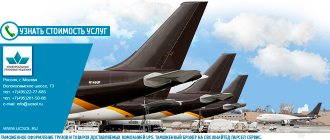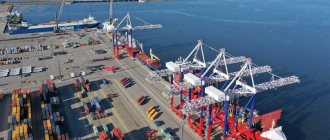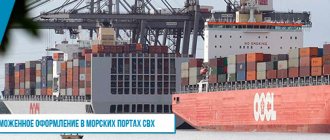Express courier services act as intermediaries for online sales. They position themselves as a service that allows the recipient to quickly receive a parcel, goods or documents, and at the same time frees him from the burden of customs clearance. However, in reality, the addressee does not always receive his shipment on time. Recently, cases of delays of parcels at customs, both addressed to individuals and legal entities, have become more frequent. This is partly due to the coronavirus pandemic, partly due to changes and tightening of the rules for customs clearance of parcels delivered by courier services.
Popular courier services
ATTENTION!
We work only with legal entities. FEDEX is an express carrier that works with individuals and legal entities. Delays in processing parcels at customs occur due to heavy workload or when certain problems arise. The main office of FEDEX is located at: Moscow, st. Shabolovka, 34, building 3. Contact phone: Phone: +7 495 797 2774. Fax.
DHL is the world's largest express cargo carrier. Since April 12, 2010, the DHL network has limited the import of goods for individuals into the territory of the Russian Federation. It is only possible when sent from certain online stores. Moreover, if the cargo is still mistakenly sent to the territory of the Russian Federation, the company independently and at its own expense returns it to the sender. More information about the restriction can be found on the DHL website. The DHL Express office in Moscow is located at: st. 8th March, no. 14. Contact phone number.
UPS is an American company. Low cost express carrier. Its advantage is that it has a wide network of representative offices around the world. Cargo is delivered to both individuals and legal entities. Delays of up to two weeks occur due to the large volume of parcels and goods. The office is located at the address: Moscow, Derbenevskaya embankment, 7, building 4. Contact phone: +7 (495) 961-2211. Fax: +7 (495) 961-2212.
EMS is a broker for customs clearance of goods. Location address: Moscow, Varshavskoe highway, 37. Contact phone: +7 (495) 956-20-67. Fax Support: 8 800 1 000 000 (toll free).
TNT is the full name. This is the most inexpensive company on the express carrier market, which is popular among entrepreneurs. Due to the large flow of parcels and shipments, the release of goods may be delayed by up to three weeks. The main office of the company is located at: Moscow, st. 2-ya Lykovskaya, 63, building 10, Contact phone: 8 800 100 2777. Fax: +7 (495) 797-2701.
Documents for customs clearance
For customs clearance of a parcel delivered by courier service, you will need:
- invoice;
- air waybill;
- a copy of an individual’s passport with registration;
- explanations.
Note! There may be several air waybills. Cargo may arrive in different batches and at different times. All air waybills will be required for customs clearance, otherwise it will not be possible to clear the cargo completely.
Services that will help you find out that the parcel has been successfully processed at customs
We recommend paying attention to the following parcel tracking services:
- gdeposylka.ru
- 1track.ru
- postal.ninja
- track24.ru
Enter the code of your mail item in the search bar of the listed resources and view the status of your correspondence. It is quite possible that you will receive the missing background information about the fate of your shipment.
Typical problems during customs clearance
Express carrier companies have their own customs representatives, and they often handle customs clearance on their own. Their services include a typical set: translation and preparation of documentation, preparation of declarations, etc.
When customs clearance of parcels, the express carrier can organize phytosanitary, veterinary and quarantine control procedures. But the service is provided on a paid basis. The service of storing cargo in a temporary storage warehouse is also provided; it is free only in the first three days after the arrival of the cargo. If the goods are delayed at a temporary storage warehouse, then storage is paid for.
Important! Parcels sent to individuals may be subject to inspection as part of a random check.
The most common problems encountered during customs clearance are:
- cargo of individuals is not released;
- errors in documentation;
- recognition of cargo as a commercial consignment;
- do not always provide complete information about the cargo, and sometimes provide misinformation.
According to customs legislation, commercial consignments are prohibited from being imported by individuals, so one way to solve the problem is to collect a package of documents that will confirm that the goods will be used for non-commercial purposes. The legislation does not define in detail what kind of cargo is considered commercial, so customs services classify cargo based on logic and common sense. For example, 5 video cameras can be considered a commercial lot, but 5 notebooks are not. In this case, there are several options for resolving the situation:
- returning the parcel to the sender;
- adjustment of the recipient to a legal entity or individual entrepreneur, which is accompanied by the payment of customs duties, registration of permits and verification of the labeling of goods (goods subject to mandatory certification and sent to legal entities or individual entrepreneurs must be certified by a Russian company, and the labeling must also comply with the legislation of the EAEU );
- registration of a parcel to a legal entity, which is a kind of intermediary. The final recipient of the goods is an individual.
When collaborating with a specific courier service, the situation is complicated by related problems:
- There is a small staff of declarants, so customs clearance may take a long time.
- No one is interested in proving the non-commercial purpose of a product.
- It is difficult to reach the courier service by phone.
- Several parcels must be sent for inspection. There is a great risk that yours will be among them.
- The large flow of parcels addressed to individuals causes a reluctance to deal with the problems of each client.
The carriers themselves do not deprive the client of the right to choose a customs representative or independently declare the cargo. Another thing is that they are reluctant to connect a third-party customs broker to customs clearance, since this deprives them of a certain share of the profit. In addition, for example, DHL Express charges a fee for completing the formalities associated with outsourcing the customs declaration process to an independent broker.
Problems with Aliexpress parcels and their solutions
Parcels from Aliexpress that go to individuals or legal entities, no matter, are checked by customs. For one reason or another, they may be delayed. For example, customs may require you to present additional documents: passport or tax identification number. In fact, there are quite a few reasons for the delay of parcels to Ali:
- classification of the parcel as a commercial shipment;
- counterfeit products;
- low cost;
- lack of necessary documents or errors in them;
- the actual weight does not correspond to that stated in the documents;
- the product is prohibited for import under the legislation of the Russian Federation or the Customs Union;
- duty-free import standards have been exceeded and a duty must be paid.
Normal time for customs clearance of parcels: from several hours to 3-5 days. You should be wary of the situation when the parcel is at the “Customs clearance has begun” stage for more than 10 days. The problem is also indicated by the “Customs clearance failed” status. The addressee must find out the reason for the delay or refusal in customs clearance independently by contacting the customs authority.
Note! A different outcome may occur if the statuses are indicated: “Customs clearance error”, “Additional information is required for customs clearance”. It is possible that the goods will still be released by customs, or perhaps it will be returned to the seller or will be detained until the circumstances are clarified.
The main goal of a buyer who has not received a product is to return the money for the order. And this is where difficulties arise. If the goods are delayed due to the fault of the buyer, then you can first try to negotiate with the seller, and if that doesn’t work, open a dispute on Aliexpress. If the seller is at fault, then the buyer must prove that he is right. This often requires documents with stamps and signatures from the customs service. Their receipt can take up to 30 days - this is how long the request to receive the necessary papers is processed. These documents will contain the rationale for refusal of customs clearance.
At the same time, it is worth remembering that after initiating a dispute, these documents must be presented to Ali within 7 days. Because of this temporary discrepancy, there is no need to rush to open a dispute.
A convenient moment to reach an agreement with the seller is when the parcel has already been sent back and is on its way to the seller. During this period, you can agree with the seller to return the full cost of the goods or, if it is your fault, to return the amount paid minus the cost of delivery.
When visiting a postal distribution point you must present:
- identification document;
- copies of documents from relatives, with which you can prove that the goods were intended for their personal use;
- information about goods;
- financial documents evidencing payment for the goods.
Where are parcels and items delivered by courier services cleared and stored?
For customs clearance of parcels and shipments of different services, different customs posts and warehouses are used by default.
FEDEX – customs post in Vnukovo (Vnukovo Airport (cargo).
DHL – stores parcels and shipments at four of its own temporary storage warehouses:
- Sheremetyevo, temporary storage warehouse of DHL International CJSC (the main clearance of express cargo takes place here);
- Moscow, temporary storage warehouse of DHL International JSC;
- Pushkino, temporary storage warehouse "DHL Logistics" LLC;
- St. Petersburg, temporary storage warehouse of DHL International JSC.
Customs clearance of DHL cargo is carried out by default at Sheremetyevo customs.
UPS - customs post of OTO and TK No. 2 of Vnukovo customs. From March 1, 2019, customs clearance of goods and cargo is carried out at the Aviation CED. Temporary storage warehouse "United Parcel Service (rus)" LLC, Vnukovo customs.
EMS – customs clearance is carried out through OTO and TC No. 1 t/p International Post Office.
TNT – customs clearance of parcels and shipments is carried out at the customs post of OTO and TK No. 2 t/p International Post Office.
Note! The client has the right to clear the cargo at other customs posts where it is convenient. Moreover, the cargo does not necessarily remain in the warehouse of the courier service. It can be moved through the customs procedure of customs transit to any customs post.
Features of customs clearance
Customs clearance for a legal entity is carried out by submitting an electronic customs declaration by the recipient or his representative via dedicated communication channels. Submission of the declaration is accompanied by the payment of customs duties and taxes, therefore, the HS code is determined, according to the description of the goods, duties and VAT are paid. Other shipping documents can be used as a declaration if they contain information sufficient to complete the customs clearance procedure.
According to Article 260 of the EAEU Labor Code, goods for personal use delivered to the name of an individual must be declared. The declaration is completed in Russian or English or the official language of the member state. It can be replaced by documents containing the necessary information.
Non-tariff and technical regulation measures do not apply if the goods meet cost and weight standards. Thus, the declarant is exempt from paying customs duties and taxes if the cost of the shipment to one recipient does not exceed 200 euros and the weight of 31 kilograms. If there is an excess in one or another parameter, then 15% of the cost or 2 euros for each kilogram in part of the excess is paid.
If weight or cost standards are exceeded, which currently amount to 200 euros or up to 31 kg per individual, a passenger customs declaration is submitted to the customs authority. It can be submitted directly by an individual, a customs representative of an express delivery service or an independent customs broker who acts within the framework of an agreement concluded with the recipient of the parcel. As an experiment, from 07/05/2020 to 08/01/2020, Order No. 1060 of the Federal Customs Service of Russia dated July 5, 2021 is in force, according to which express cargo can be processed electronically using a passenger customs declaration. As part of this experiment, interdepartmental electronic interaction and access to relevant databases are being organized. This opportunity is not provided by all customs authorities.
- The PTDEG submitted by the customs representative must contain the recipient’s TIN (for citizens of the Russian Federation) or an alphanumeric code for foreign individuals consisting of:
- letter code of the country of registration in accordance with the classifier of countries of the world;
- two-digit value of the type of identifier of information about a foreign individual or stateless person;
- series (if available) and identification document number.
When declaring goods through customs, it is mandatory to provide information about the electronic link to the purchased product indicated on the store’s website to the PTDEG.
Important! According to the Decision of the Board of the Eurasian Economic Commission dated August 28, 2021 No. 142 “On customs declaration of goods delivered by the carrier as express cargo using a goods declaration”, valid from 07/01/2019, for express cargo if their value is less than 200 euro, a special form of customs declaration is established: declaration of goods for express cargo (DTEG). AFTER 02/01/2020, the DTEG WILL BE SUBMITTED IN ELECTRONIC FORM.
As with regular customs clearance, express cargo is placed in a temporary storage warehouse. In this case, the carrier. It must be located at the location of the customs authority performing the declaration.
According to Art. 119 of the EAEU Labor Code, the goods must be released within 4 hours from the moment of registration of the passenger customs declaration, but this period can be extended for one reason or another by 10 working days. For example, a decision on the release of goods subject to payment of customs duties is made after receiving information about the fulfillment of the obligation to pay customs duties in relation to the goods contained in the shipment, up to 10 days inclusive from the date of generation of the payment document.
Important! The status of the cargo is clarified with the express carrier. You should also contact him if delivery deadlines are missed.
What determines the amount of customs duties to IPOs?
The decisive factor is the estimated value of the cargo. The higher the price, the higher the duty.
How much do you need to pay for a parcel and what can affect the amount of customs duty?
- The cost of the parcel is declared by the sender (there is a special column for this in the postal receipt);
- The amount of payments is calculated in accordance with the customs value of the goods (including transportation costs);
- An undervalued price may attract the attention of the inspection; the authorities have the right to change the cost of the goods upward, on the basis of which customs duties will be calculated, focusing on the cost of analogues;
- To confirm the price of the contents of the parcel, it would be useful to include accompanying documentation (invoice, technical passport, sales receipts);
- If the value column indicates “gift”, then the inspector will independently determine the amount of customs duty payment for the parcel.
What to do if the parcel is stuck
Action plan if the parcel is stuck at customs due to the need to pay customs duties:
- When a shipment message is received from the seller, you need to track the location of the package using the air waybill number directly on the express carrier's website or on a third-party site.
- In a few days the parcel will arrive at customs. They should notify about this, but they rarely do.
- Next, you need to call the service and find out who is responsible for the parcel by providing the invoice number.
- Now you need to call the employee assigned to the parcel and inform him either that customs clearance will be carried out by an independent customs broker or independently. He is also given an email address.
- An invoice and waybill, as well as contact details of the customs commissioner, are sent to the post office.
- Now you need to make a photocopy of your passport with registration, print out an invoice, a delivery note, an online store page where the price of the product and its name are indicated, receipts, checks or an e-mail that confirm the debiting of money from the bank account for the product, a page with a letter from a courier service employee .
- The Commodity Code of Foreign Economic Activity determines the product code, the amount of duty and the amount of VAT. The amount of customs duties is calculated.
- It is necessary to visit customs and fill out documents: an application for admission to customs and a list of the contents of the parcel with a note about the HS codes and cost.
- A letter arrives at the reception with an invoice for payment. This bill must be paid.
- Afterwards, you can call the courier service employee and agree on when you can pick up the parcel.
Note! To enter the customs area, you may need to order/issue a pass in advance.
Recently, parcel delivery times have been delayed due to changes in customs legislation. Carriers have not yet fully mastered the new rules; imperfections in the service’s software also play a role. According to FCS orders No. 1060 and 112, orders from foreign online stores are delayed at customs, since, in particular, FCS order No. 112 establishes a new form for providing data. Previously, customs software processed 500 items. Now the declaration must include information about goods from no more than 100 parcels, and this significantly increases the workload of the customs inspector. In addition, the number of inspections increased almost 10 times, but the number of personnel remained the same. Because of this, the time required for customs clearance of parcels increases. The latter measure was introduced due to the systematic declaration of goods for commercial use as goods for personal use.
You have received a customs notification (that the parcel has been detained by customs)
You have received a customs notification indicating the reason for the international postal delay. This means that you need to come to the specified address with this notice and other documents in order to declare the goods in the parcel and pay customs duties. The recipient can find out in advance that the parcel will arrive with a customs notification by tracking the parcel through the postal operator’s website.
| The Federal Customs Service sends a document with the stamp and signature of the customs authority. This document is commonly called a Customs Notification. |
Customs Broker
Customs broker services are provided on a contractual basis. After concluding an agreement, the customs broker bears full legal and financial responsibility to clients and customs. When performing customs operations, a customs representative has the same rights as the individual on whose behalf he performs customs operations.
Why is it more profitable to contact a third-party customs broker? Because courier services are large carriers, and their customs clearance services are expensive. It’s easier to contact a customs representative who can clear the parcel through customs and prepare customs documents for a more reasonable cost. For example, a customs broker SB Cargo can take on this part of the procedure - customs clearance of a parcel from China or another country. Contact us by phone or email
Who can pay customs duties if the parcel limit is exceeded
If the parcel limit is exceeded, customs duties can be paid by the recipient or the customs representative. A customs receipt order (CRO) is attached to the parcel by customs, which indicates the amount to be paid and the reason - which limit has been exceeded. A customs payment is paid if the duty-free limit is exceeded. Our specialists are ready to help you with calculations, communication of details for payment or payment of customs duties for the client when preparing documents at customs. With us, customs clearance will become easy and fast!










